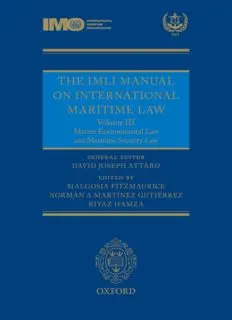
The IMLI Manual on International Maritime Law Volume III: Marine Environmental Law and Maritime Security Law PDF
Preview The IMLI Manual on International Maritime Law Volume III: Marine Environmental Law and Maritime Security Law
THE IMLI MANUAL ON INTERNATIONAL MARITIME LAW THE IMLI MANUAL ON INTERNATIONAL MARITIME LAW Volume III: Marine Environmental Law and Maritime Security Law General Editor DAVID JOSEPH ATTARD Edited by MALGOSIA FITZMAURICE NORMAN A MARTÍNEZ GUTIÉRREZ RIYAZ HAMZA TheopinionsandviewsexpressedintheChaptersofthisManualarethose oftheirrespectiveauthorsanddonotnecessarilyreflecttheopinions orviewsofIMO,itsSecretariat,orIMLI. 1 1 GreatClarendonStreet,Oxford,OX26DP, UnitedKingdom OxfordUniversityPressisadepartmentoftheUniversityofOxford. ItfurtherstheUniversity’sobjectiveofexcellenceinresearch,scholarship, andeducationbypublishingworldwide.Oxfordisaregisteredtrademarkof OxfordUniversityPressintheUKandincertainothercountries ©theseveralcontributors2016 Themoralrightsoftheauthorshavebeenasserted FirstEditionpublishedin2016 Impression:1 Allrightsreserved.Nopartofthispublicationmaybereproduced,storedin aretrievalsystem,ortransmitted,inanyformorbyanymeans,withoutthe priorpermissioninwritingofOxfordUniversityPress,orasexpresslypermitted bylaw,bylicenceorundertermsagreedwiththeappropriatereprographics rightsorganization.Enquiriesconcerningreproductionoutsidethescopeofthe aboveshouldbesenttotheRightsDepartment,OxfordUniversityPress,atthe addressabove Youmustnotcirculatethisworkinanyotherform andyoumustimposethissameconditiononanyacquirer CrowncopyrightmaterialisreproducedunderClassLicence NumberC01P0000148withthepermissionofOPSI andtheQueen’sPrinterforScotland PublishedintheUnitedStatesofAmericabyOxfordUniversityPress 198MadisonAvenue,NewYork,NY10016,UnitedStatesofAmerica BritishLibraryCataloguinginPublicationData Dataavailable LibraryofCongressControlNumber:2014940433 ISBN978–0–19–968394–9 Printedandboundby CPIGroup(UK)Ltd,Croydon,CR04YY LinkstothirdpartywebsitesareprovidedbyOxfordingoodfaithand forinformationonly.Oxforddisclaimsanyresponsibilityforthematerials containedinanythirdpartywebsitereferencedinthiswork. Tothosewhoservetheruleofinternationalmaritimelaw FOREWORD Established in 1948 as a specialized agency of the United Nations, the Interna- tional Maritime Organization (IMO) is the global standard-setting authority for the safety, security, and environmental performance of ships engaged in interna- tionaltrade.Itsprimaryfunctionistocreate,andkeepuptodateinthelightof emergingneeds,aregulatoryframeworkfortheshippingindustrythatisuniver- sallyimplementedwithineffectivenationalmaritimeadministrationstructures.In this respect, IMO also provides the international inter-governmental forum in whichtheprocessofagreement,adoption,andimplementationofregulationsand standardstakesplace. Buildingonitsmandate,whichnowencompassesenergyefficiency,newtechnol- ogyandinnovation,maritimeeducationandtraining,maritimesafetyandsecur- ity,vesseltrafficmanagement,facilitationofmaritimetraffic,andthedevelopment ofthemaritimeinfrastructure,IMOisnowresponsibleformorethanfiftyinter- national treaties and has adopted related thereto amendments to ensure that its globalstandardsmeetemergingchallengesandkeepabreastwithdevelopmentsin shippingtechnology. ThesuccessofIMO’sadoptedlegalframeworkdependsprimarilyonitsadoption, incorporation,andeffectiveimplementationbyStates.ForthispurposeIMOhas established a dedicated technical cooperation programme which assists States to develop the necessary legislative frameworks and maritime administration struc- turesandtherebyimplementIMOstandardsfullyandeffectively.TheOrganiza- tion has also recognized that, in parallel with the provision of technical cooperationprogrammes,itisofparamountimportancetofosterhumanresource developmentandinstitutionalcapacitybuilding.Withthisinmind,IMOestab- lishedtheInternationalMaritimeLawInstitute(IMLI)in1988.LocatedinMalta, under the patronage of the Government of Malta, IMLI has been IMO’s focal pointforthetrainingofspecialistsinmaritimelaw.Withmorethantwenty-five yearsintheserviceoftheruleofinternationalmaritimelaw,IMLIisnowtrulya centreofacademicexcellencecontributinggenerallytothedevelopmentanddis- seminationofknowledgeandexpertiseininternationalmaritimelaw. To contribute even further to the international maritime community, IMLI decided to mark its twenty-fifth anniversary with the publication of The IMLI ManualonInternationalMaritimeLaw.VolumesIandIIdealingwiththeLawof vii Foreword theSeaandShippinglawrespectivelyhavebeenverywellreceivedbytheinterna- tional community. It thus gives me great pleasure, as the new Chairman of the IMLI Governing Board, to write this foreword forVolume III which studies the areasofmarineenvironmentallawandmaritimesecuritylaw.Thesetwoareasof international maritime law are not only of topical importance but are broad enoughtoencompassaspectsofbothlawoftheseaandshippinglaw,hencetheir complexityandtheimperativeneedtodedicatethemaseparatevolume. IMOhasbeenattheforefrontoftheprogressivedevelopmentofmarineenviron- mental law in all its aspects. Regarding prevention, IMO adopted, and over the years amended, the 1978 MARPOL Protocol, which is the main international treatycoveringpreventionofpollutionofthemarineenvironmentbyshipsfrom operational or accidental causes.The scope of the 1978 MARPOL Protocol was expandedtoaddressissuesrelatingtoatmosphericpollutionthroughtheadoption ofthe1997MARPOLProtocol.Thetwoprotocolshavebeencomplementedwith treaties dealing, inter alia, with the control of harmful anti-fouling systems on ships(2001AFSConvention);thepreventionofthepotentiallydevastatingeffects ofthespreadofinvasiveharmfulaquaticorganismscarriedbyships’ballastwater andsediments(2004BWMConvention);andthesafeandenvironmentallysound recyclingofships(2009HongKongConvention).Insofaraspollutionprepared- ness, response, and cooperation are concerned, the primary treaties adopted by IMO are the 1990 OPRC Convention and its 2000 OPRC-HNS Protocol. Despite best practices followed, accidents do happen, and when they do it is important to lay down an effective framework regarding liability and compensa- tion. In this respect, IMO has adopted a number of treaties including the 1992 CLC Convention, the 1992 Fund Convention, the 1996 HNS Convention and therelated2010HNSProtocol,andthe2001BunkersConvention. IMOhasalsobeenveryactiveinthedevelopmentofalegalframeworkregarding maritimesecurity.Topreventunlawfulactsagainstthesafetyofmaritimenaviga- tion,IMOadoptedthe1988SUAConventionand1988SUAProtocolandtheir respective protocols in 2005. Other measures to enhance maritime security includeChapterXI-2ofthe1974SOLASConventionandtheassociatedInterna- tional Ship and Port Facility Security (ISPS) Code; a number of measures to addressthethreatofpiracy,armedrobberyagainstships,andotherillicitmaritime activities; measures to reduce risks of stowaways, guidelines regarding the use of PrivatelyContractedArmedSecurityPersonnelonboardships;Guidelinesforthe PreventionandSuppressionoftheSmugglingofDrugs,PsychotropicSubstances and Precursor Chemicals on Ships engaged in International MaritimeTraffic; as well as the development of voluntary guidelines on adequate anti-cyber security practices. Following the approach of the previous volumes, Volume III was written and edited by a group of eminent academics and practitioners, who are the world’s viii Foreword leading experts in their fields, in a manner that will interest both academics and practitioners.Itnotonlyaddressesthesubjectsfromahistoricalandcurrentstand- point, but also delves in the many emerging issues that prompt the continuous reassessmentofinternationalrules. Thisisnotonlyamonumentalcollectionofstudies,butalsoatruetestamentto the Institute’s success. I highly recommend The IMLI Manual on International MaritimeLawtoallthosewhohaveaninterestinmaritimeaffairs. Ki-tackLim Secretary-General,InternationalMaritimeOrganization Chairman,IMLIGoverningBoard ix
